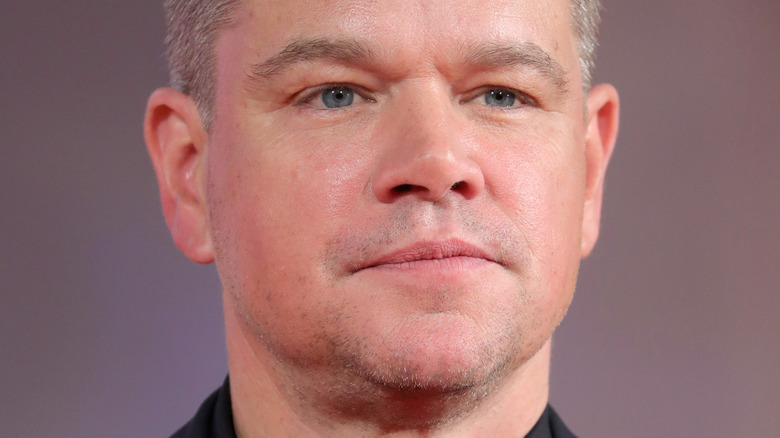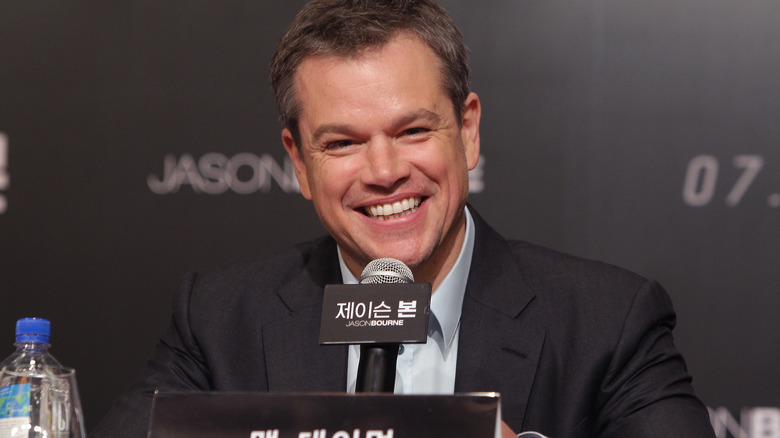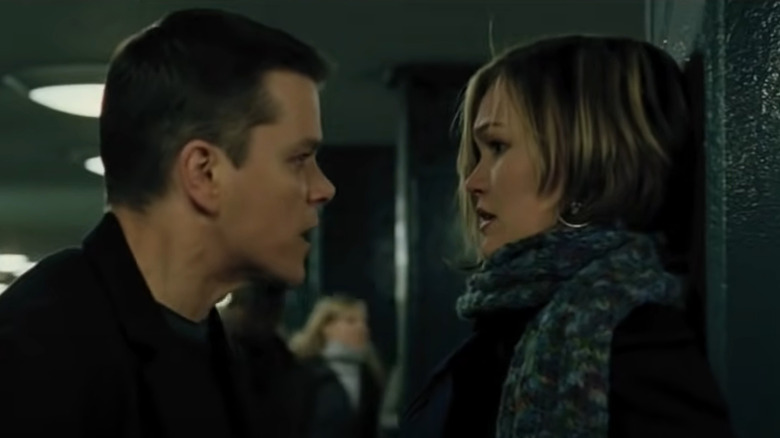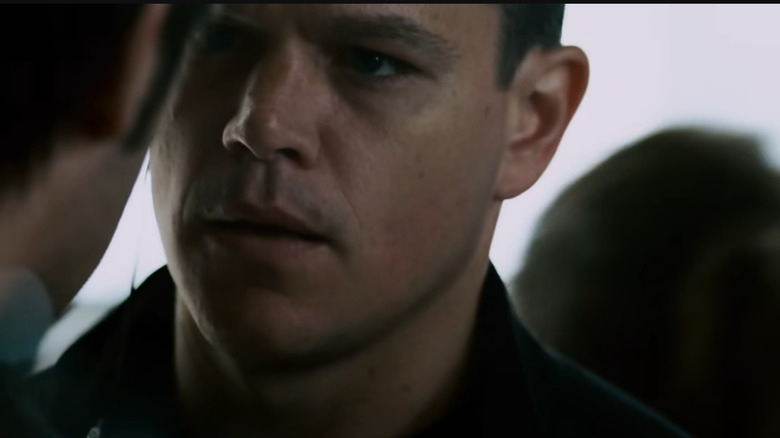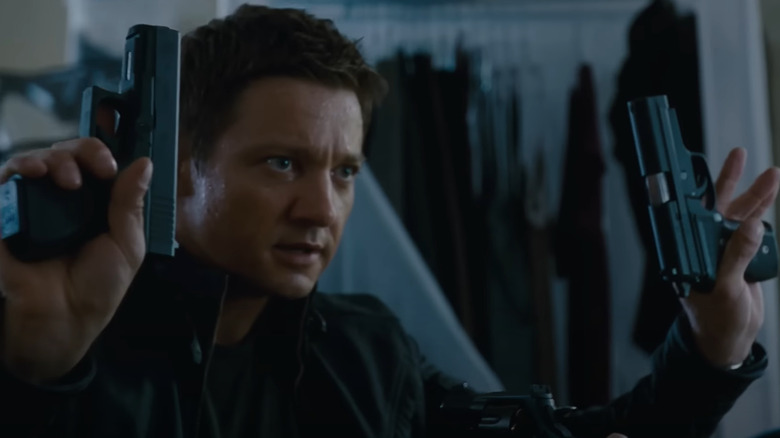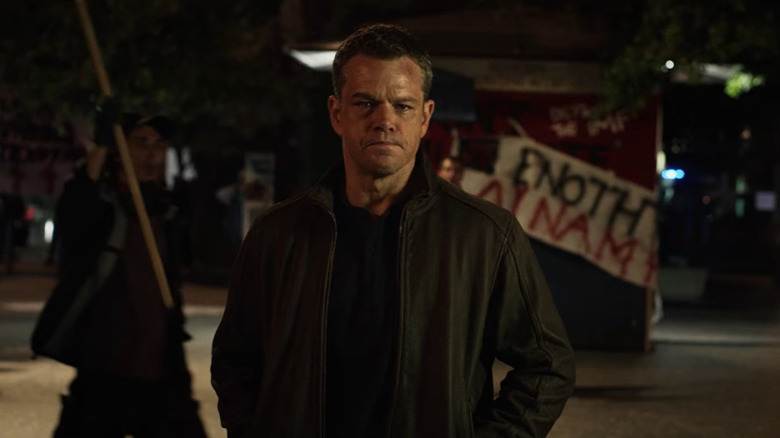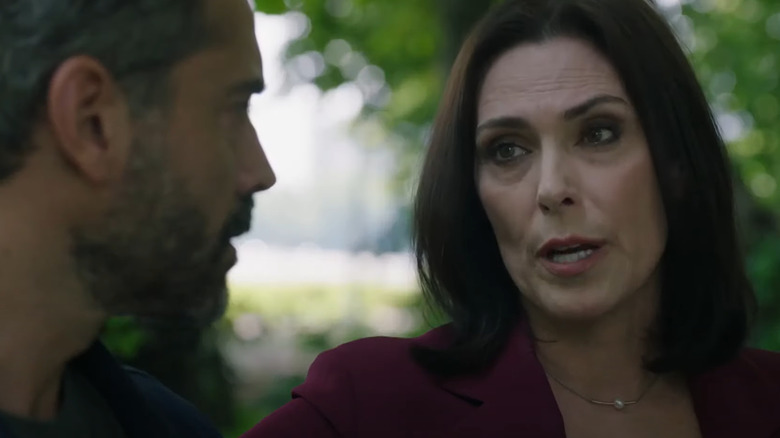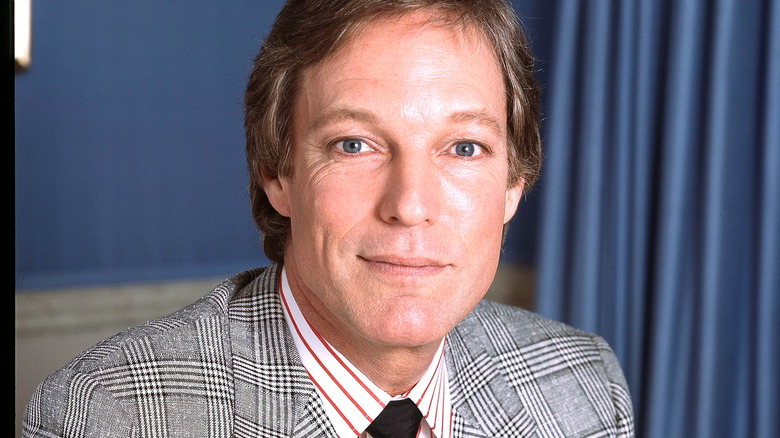How To Start Watching The Jason Bourne Franchise
The "Bourne" movie franchise, based on the novels by Robert Ludlum, successfully introduced a new kind of post-9/11 espionage action movie to mainstream audiences. These films were paranoid, intense, and cynical. Protagonist Jason Bourne (Matt Damon) wasn't a smooth, womanizing gentleman like James Bond. Instead, Bourne was a confused amnesiac assassin trying to uncover who he was and the horrific things he'd done in the past for a secret CIA program.
The action scenes in the films have also earned praise for their brutality and reliance on stunt work (via Polygon). Director Doug Liman insisted on using handheld cameras for the first movie, creating a more realistic visual language that the other entries in the franchise built upon (via The Guardian). And audiences responded — the series has now grossed over $1.6 billion at the box office over the past two decades, per The Numbers.
New viewers may feel intimidated by how many films there are in the series. Fear not, for here is a look at the best order to watch them.
The Bourne Identity is the best starting point
It's best to start with the very first film in the franchise, "The Bourne Identity," from 2002.
A wounded young man is found in the Mediterranean with no memory of who he is, or why there's a small device embedded in his hip. However, the CIA program he was part of is very much aware of who Bourne is: a covert assassin who has now gone rogue with government secrets. The black ops program then sends assassins after Bourne and his traveling companion, Marie Kreutz (Franka Potente). However, Bourne's self-preservation instincts soon kick in, and as it turns out, he is still very good at fighting and killing.
Production on the film was troubled, thanks in part to rewrites, and battles between the studio and director (via The Guardian). But "The Bourne Identity" ultimately did well at the box office, per Box Office Mojo, and on home video (via Billboard). It soon received a sequel, though Liman would not return for the second installment.
The Bourne Supremacy is an incredible sequel
For the second film in the developing "Bourne" franchise, Paul Greengrass took over as the director. "The Bourne Identity" hadn't exactly been a goofy comedy, but "The Bourne Supremacy" was even darker and more psychological than its predecessor. Audiences responded well, with the sequel grossing nearly $100 million more than the first film at the box office (via The Numbers).
After Bourne, now in hiding, is framed by a Russian operative (Karl Urban) for a killing he didn't commit, he's once again forced on the run from the CIA. Bourne must clear his name with Deputy Director Pamela Landy (Joan Allen) while atoning for one of the biggest sins from his past.
"The Bourne Supremacy" didn't just plunge the series even further into the morally gray territory; it also ramped up the frenetic, handheld style of the action scenes from the previous film. The Film Stage even credited Greengrass as, "the man who single-handedly popularized the technique of 'shaky cam' for the new millennium."
The Bourne Ultimatum appeared to be the end of a trilogy
"The Bourne Ultimatum," again directed by Greengrass and released in 2007, featured Bourne attempting to find real answers about Operation Treadstone, the secret assassination program he was involved in. But the former operative also discovers that a new program, Blackbriar, led by Noah Veson (David Straithairn), is now after him as well.
The third "Bourne" film outperformed the previous entry at the box office once more (via The Numbers) and was met with massive critical acclaim (via Rotten Tomatoes). Roger Ebert characterized the praise by pointing out how Greengrass, "not only creates (or seems to create) amazingly long takes but does it without calling attention to them." The National Board of Review even named "The Bourne Ultimatum" one of the top 10 films of 2007.
But Matt Damon and Paul Greengrass each believed this would be their last film in the series. Both of them had found working without a complete script during production extremely challenging, and Damon also saw "Ultimatum" as the final part of the story they were telling (via The Guardian). A new creative team was eventually handed the reins to continue the series.
The Bourne Legacy hoped for success with a different fugitive assassin
With Damon and Greengrass not coming back to the "Bourne" franchise, Tony Gilroy, who'd written the first 3 films, was offered the director's chair for the fourth film in the series. Gilroy decided not to recast Jason Bourne, but to make a film centered on another assassin character around the same period that "The Bourne Ultimatum" takes place (via Time).
After the events of "Ultimatum," black ops agent Aaron Cross (Jeremy Renner) is forced to go on the run when his program is ordered shut down and anyone involved is eliminated. Fleeing alongside another survivor, Dr. Marla Shearing (Rachel Weiscz), Cross tries to figure out the truth behind Operation Outcome.
"The Bourne Legacy" did well at the box office, but it didn't do nearly as well as "Supremacy" and "Ultimatum" (via The Numbers). It also received mixed reviews, with The Hollywood Reporter characterizing the fourth franchise entry as "capable but uninspired."
According to Inverse, there was supposed to be a fifth "Bourne" film with Renner reprising his role as Cross, but Damon and Greengrass would return to the franchise after "Legacy."
Jason Bourne brought the former assassin back to multiplexes
Matt Damon convinced Paul Greengrass to collaborate on 2016's "Jason Bourne" so they could reflect Jason Bourne within a new political reality (via The Guardian). In the newest installment, an older, wiser Bourne isn't just battling secret assassins, but dealing with the fallout of social media and government leaks. Teaming up with former CIA agent Nicky (Julia Stiles), Bourne also discovers more about his origins and how he came to Treadstone in the first place.
The official fifth film entry in the "Bourne" franchise didn't quite capture the movie world by storm. It grossed $415 million internationally (via The Numbers), but as Damon himself pointed out in The Toronto Sun, "Jason Bourne" still made less money than the third film had nearly a decade before. The film also received mixed reviews from critics, much like "The Bourne Legacy" (via Rotten Tomatoes).
Damon suggested that "maybe people are done with the character" to The Toronto Sun in 2017, burying hopes for a sequel. Nevertheless, Universal made a go of adapting part of the "Bourne" universe to television for the first time in years.
Sadly Treadstone only lasted a season
"Treadstone" was designed, like "The Bourne Legacy," to be part of the franchise's continuity while telling its own story. Executive Producer Ben Smith noted, "There are references for careful viewers that they will know that they're firmly within the world of Jason Bourne" (via Den of Geek). The series also employed a similar grounded, gritty fighting style akin to the movies.
"Treadstone" debuted on the USA Network in 2019 and focuses on the origins of Operation Treadstone, as well as what happens after several "assets" awaken in the present day after the program has been terminated.
However, "Treadstone" received unenthusiastic reviews from critics, receiving a 44% rating on Rotten Tomatoes. The Hollywood Reporter summarized its review by calling the show "all action and no brains." Viewers also stayed away from the series as well. Ultimately, USA decided to cancel "Treadstone" after one season, in a critical blow to the "Bourne" franchise (via Deadline).
The last thing to watch is the 1988 Bourne Identity mini-series
To date, "Treadstone" is the most recent entry in the continuity established by 2002's "The Bourne Identity." But there's also a 1988 ABC mini-series version of the first movie as well if you want to have fun with a slightly goofier, but more faithful adaptation of Ludlum's original novel.
The two-part series actually sticks to the novel's plot, with Jason Bourne (Richard Chamberlain) being depicted as a fairly heroic figure. Treadstone is even depicted as a fairly positive organization that isn't actively trying to silence Bourne. Where the 2002 "Bourne Identity" is steeped in post-Cold War paranoia and regret, the 1988 TV film is more morally black and white.
Reviewing the mini-series, Mandatory wrote, "As a Cold War era spy picture it holds up reasonably well with the rest of its then-contemporary brethren." Fans just shouldn't watch it expecting the same kind of tone as the 2002 movie. It's still a fine way to complete a viewing of the "Bourne" franchise anyway.
